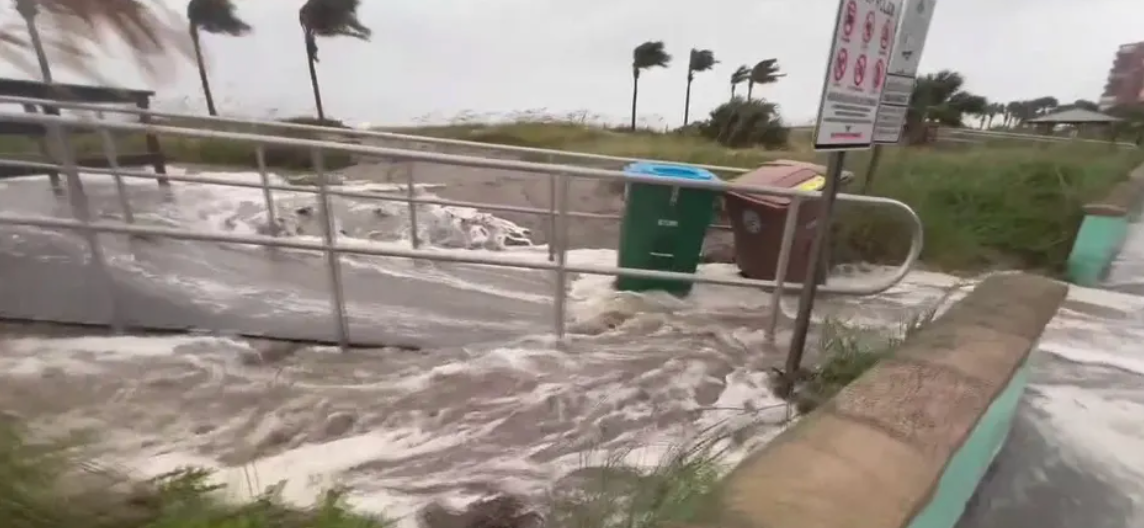Donna Fagersten had taken refuge at a friend’s home on the top floor as Hurricane Helene tore through northern Florida, leaving a devastating trail of destruction and more than 100 casualties in the southeastern U.S.
As the storm appeared to calm, the 66-year-old teacher, just days away from her retirement, made a fateful choice to return home to rescue her cat.
When Hurricane Helene hit Florida on September 26, 2024, around 11 p.m., the Category 4 storm triggered flash floods, forcing residents to scramble for safety. One of the hardest-hit areas was Pinellas County, particularly in the Tampa Bay region, where at least 11 people lost their lives.

Among the victims was Donna Fagersten, a second-grade teacher from Ponce De Leon Elementary in Pinellas County.
According to her best friend Heather Anne Boles, Donna was set to retire the following week after dedicating 35 years to teaching. When the storm hit, Donna sought shelter with Boles and her partner, Mike Moran. As the storm surge rushed in, they retreated to the third floor of Boles’ mother’s home, across from the beach where Donna lived.
Boles recalled that as the storm seemed to settle, Donna insisted on going home to check on her cat, despite Boles’ pleas to stay. Tragically, another surge and high winds returned, battering the coastline.
A neighbor later came to their shelter, reporting that someone had been found floating in the parking garage. They quickly pulled Donna from the water and began CPR, but despite their efforts and the arrival of fire rescue by boat, they were unable to revive her.
Detectives later confirmed that Donna had drowned in her home, which had been flooded with water.
Family and friends have since remembered Donna as a “beautiful person” who was deeply committed to her students and community. In a Facebook post, Mary Gleason Lyons, a colleague and friend, described Donna as a dedicated teacher with a big heart, touching the lives of many students over her 35-year career.

Online tributes poured in, with former students and friends expressing their sadness at her passing and remembering her kindness and warmth.
While Boles and Moran are now left to clean up after the floods, which destroyed most of their belongings, the loss of their best friend is what hurts the most. “This is the worst we have ever seen,” Boles said, reflecting on the storm’s destruction compared to Hurricane Irma, where they managed to keep their home and belongings intact.
On a positive note, Donna’s cat survived, and her friends are working to find him a new home.
Hurricane Helene, which cut a destructive 800-mile path northward, left more than 2 million homes without power and claimed over 100 lives, according to USA Today.
He is a legendary musician, and we have all sung his songs, but he is currently ill and in suffering.

The renowned Genesis lead singer and drummer Phil Collins has enjoyed enormous success in the music business over his illustrious career.
Joining Michael Jackson and Paul McCartney as the only performers with over 100 million records sold through both solo and collaborative projects, he is one of three. Collins was exposed to music at a young age. He was born on January 30, 1951, in London, England, to parents who were artists.
The move that would define his sound came when he was five years old and received a homemade drum kit from his uncle. It included tambourines, triangles, cymbals, and miniature drums.

Key bands like The Shadows led the way as the English beat genre started to take shape. In addition to leading this movement, Collins would frequently perform at get-togethers thrown by his parents’ sailing club.
Collins was first exposed to rock and roll at the age of fourteen, when The Beatles motivated him to buy a record player and Please Please Me. He would put his drums in front of a mirror and turn up the record player’s volume so he wouldn’t have to look at what he was doing.
To learn how to read drum music, which was necessary if one wished to work in an orchestra pit or dance band, he decided to take drum lessons from a teacher. But Collins soon discovered that reading sheet music was not nearly as good as playing spontaneously.
In the 1970s, Collin’s life took an unexpected turn after he came upon an advertisement for Genesis’ drummer. Collins got in touch with them, and they were happy to have him on board, which launched his incredible musical career.
Many of the songs from The Beatles’ five albums went on to become timeless classics that we still love to this day. Due to a dearth of worthy contenders, Collins assumed the role of lead vocalist for the band quite quickly.

He took a while to get used to being a drummer as well as a voice, but he persisted and became one of the greatest musicians of our time.
As a solo artist and a member of the legendary band Genesis, Collins enjoyed enormous success in the music industry. Hits like “I Don’t Care Anymore,” “In The Air Tonight,” and “You Can’t Hurry Love” propelled him to the top of the music business.
After 25 years with Genesis, Collins made the decision to change directions in his career, concentrating on jazz ventures, movie soundtracks, and his solo endeavors. He said he hoped his old comrades would have a successful career, but when 2017 came around, he decided to go back on the road with them for their Last Domino tour.

Sadly, the pandemic forced a postponement of this tour, and shortly before it started, Phil spoke with BBC Breakfast, raising some concerns regarding his health. With Phil on vocals and Nicholas Collins on drums, the band plans to play live again despite this setback.
Nic is a fantastic drummer, but according to Tony Banks, he could add even more intensity to the already strong early Phil Collins tunes.
Speaking on his retirement from drumming, Phil remarked, “I’d like to, but I can scarcely grip a stick with this hand.” Despite the challenges that come with being physically limited, Phil has not allowed them to deter him from pursuing his love of music.

The storyteller, a man our age, spoke with a palpable sense of loss as he outlined his physical struggles. He bemoaned not being able to travel with his kid and hear about his travels.
He wasn’t sure if he wanted to carry on traveling because of his health. His remarks gave off a dejected vibe, as though he had accepted that he could no longer engage in some activities and that they were off-limits to him.

He felt pressured and faced with a difficult decision: stick on his current course or stop his travels. It dawned on him that either way, a physical constraint or a deliberate choice would force him to give up something he valued. He was troubled by this and felt as though he might miss out on a lot of opportunities in life as a result of this sudden change in his circumstances.



Leave a Reply